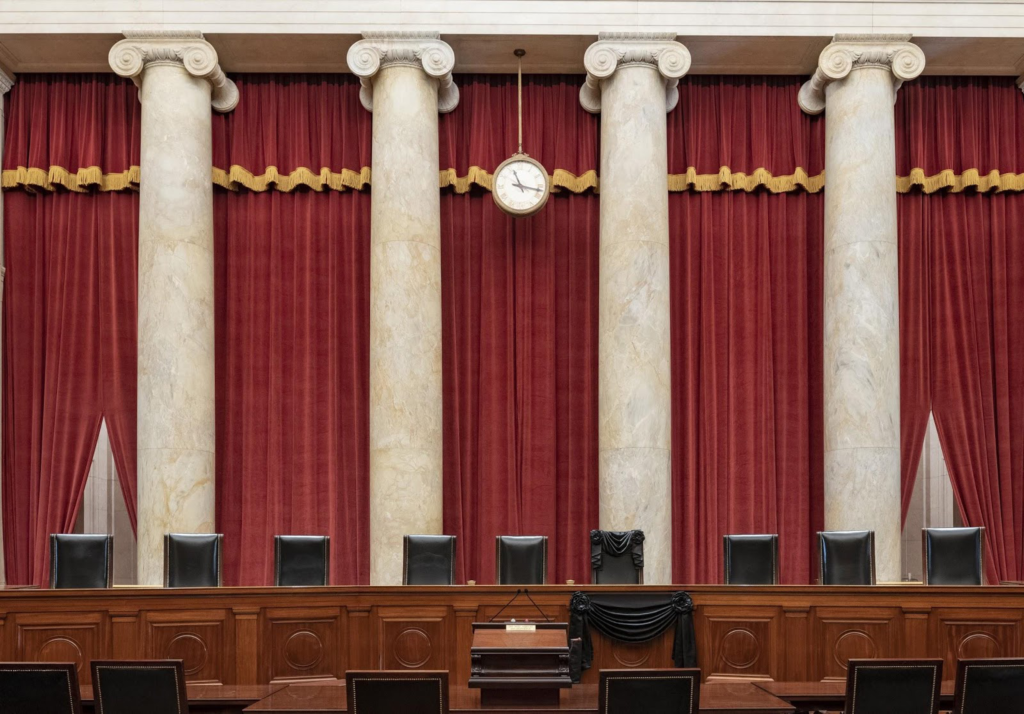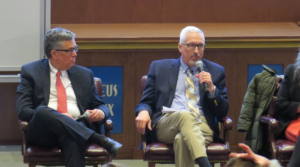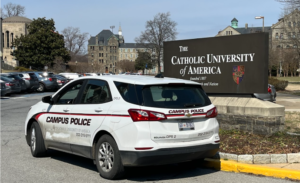A Supreme Court Vacancy: What’s Going On and How It Will Affect the 2020 Election

Image Courtesy of WFXR
By Jeremy Perillo
The passing of Supreme Court Justice Ruth Bader Ginsburg on September 18 changed the dynamic of the 2020 Election, less than forty days away. As it has become custom in Washington, the death or retirement of a justice is mired in controversy and hyper-partisanship; RBG’s death will be no different, especially given the proximity to Election Day.
While the country braced the news of RBG’s passing, many speculated what would come of Ginsburg’s now vacant seat. It did not take long for many on social media and the news to reflect on a similar circumstance President Obama found himself in the waning months of his second term.
In early 2016, President Obama had nominated the United States Circuit Judge of the United States Court of Appeals for the District of Columbia Circuit, Merrick Garland, to fill the recently passed Antonin Scalia’s seat. Soon after the nomination, Senate Majority Leader Mitch McConnell stated, “The American people should have a voice in the selection of their next Supreme Court justice. Therefore, this vacancy should not be filled until we have a new president.”
Obama found McConnell’s decision to be unprecedented and intended to execute his constitutional authority to nominate to the Supreme Court. Sticking by his position, and despite President Obama nominating Garland, McConnell did nothing to further the nomination in the Senate – no hearings or voters. After 293 days, Garland’s nomination expired, and later that month, President Trump formally nominated Justice Neil Gorsuch.
This move was highly controversial as many regarded the seat “stolen” from Garland, especially as there was no clear precedent for making such a move. At a Senate Judiciary Committee meeting in 2016, Senator Linsey Graham reflected on the Republican’s newly established precedent created, and his supposed position in the future.
“We are setting a precedent today, Republicans are,” he said. “Based on what we’re doing here today. That’s going to be the new rule. If there is a Republican president (elected) in 2016 and a vacancy occurs in the last year of the first term, you can say: ‘Lindsey Graham said let’s let the next President, whoever it might be, make that nomination,’ and you could use my words against me, and you’d be absolutely right.”
Roughly an hour after RBG died, McConnell issued a statement, offering his sympathies and recognizing the liberal icon, but also asserting that President Trump’s nominee will receive a vote on the floor of the U.S. Senate.
“Americans reelected our majority in 2016 and expanded it in 2018 because we pledged to work with President Trump and support his agenda, particularly his outstanding appointments to the federal judiciary,” McConnell said. “Once again, we will keep our promise.”
McConnell also defended, and clarified, his stance now as compared to his reasoning in early 2016.
“In the last midterm election before Justice Scalia’s death in 2016, Americans elected a Republican Senate majority because we pledged to check and balance the last days of a lame-duck president’s second term. We kept our promise. Since the 1880s, no Senate has confirmed an opposite-party president’s Supreme Court nominee in a presidential election year.”
The immediate response to the Republican majority’s position was hypocrisy. Looking back at the Obama-Garland situation nine months away from the election as compared to the less than fifty days before the 2020 Election, many see this as a mere political gain for the Republicans.
While Majority Leader McConnell made his position clear, and many Republic senators fell in line behind him, some did not, and some who’s words haunted them.
Moderate Republican Senators Susan Collins (ME) and Lisa Murkowski (AK) came out of the party line and are in opposition to taking up a vote on Trump’s nominee before November 3. Other Senators whose past comments in the 2016 hearings came back to haunt them, like Sen. Cory Gardner (CO) and Sen. Chuck Grassley (IA), have signaled their support for Trump’s nominee.
Lindsey Graham faced the most apparent flip-flop of the Republicans, given his passionate statement of the issue back in 2016, and his key role as Senate Judiciary Committee Chairman. Graham cited his disgust of the Democrat’s over the Kavanaugh hearings and the difference in party-dynamic between the White House and Senate, as two reasons for his change in position.
How does this all affect the Election? First, it alters the conversations dominating the election. For the past several months, the race has centered chiefly on the Coronavirus, and Trump’s response to it. Now, the Republicans have a chance to change the focus of the election onto a battle for the Supreme Court.
In conjunction with that last point, the Supreme Court vacancy allows Trump to appeal to his base, strict Conservatives, and moderate Republicans who were on the fence with him, to begin with. An individual who is not a fan of the President’s tweeting or coronavirus response may feel more impassioned to vote for him if the focus on the Supreme Court, and subsequently Roe v. Wade, the Affordable Care Act, etc.
Setting aside the presidential election, the various tight Senate races across the country have shifted to focus on how incumbents will respond. For some Senators, regardless of what they do, it is too late for them to change the course of their campaign, but for others like Lindsey Graham (SC), Thom Tillis (NC), Joni Ernst (IA), Steve Daines (MT), etc. it could give them a necessary boost, as well as maintain a Republican majority in the Senate.
Additionally, a 6-3 Conservative majority on the Court would be a significant shift in the Court for years to come. Trump’s three picks alone would be young and able to serve on the court for at least twenty to thirty years, dividing on the legality of major issues such as gun rights, abortion, religious liberty, the environment, LBGTQ+, and immigrant rights, to name a few.
Especially given RBG’s rockstar status among Democrats and Liberals, this issue could help boost Joe Biden, and various Senate competitors, to win their elections, grabbing the presidency and the Senate. A Supreme Court confirmation before election day could also damage Democratic morale, hurting the chances of a blue sweep.
President Trump is expected to announce his nomination on Saturday, September 26. Senate Republicans are currently laying the groundwork for a quick confirmation process and vote, including planning October confirmation hearings.






